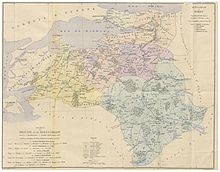Mutasarrif

In the Ottoman Empire, a mutasarrıf (Ottoman Turkish: متصرّف) was an administrative authority of any of certain sanjaks, who were appointed directly by the Sultan.[1]
History
This administrative unit was sometimes independent (e.g., Mount Lebanon Mutasarrifate or Cyprus) and sometimes was part of a vilayet (province), administered by a vali, and contained nahiye (communes), each administered by a kaymakam.[2] This rank was established in 1864 against the new Law of Villayets instead of rank of mutesellim which was abolished in 1842.[3]
"This small political unit was governed by a non-Lebanese Ottoman Christian subject and given the protection of European powers. The religious communities of the district were represented by a council that dealt directly with the governor. This system provided peace and prosperity until its abolition."[4]
The mutassarifates of the Ottoman Empire included:
- Mutasarrifate of Mount Lebanon (formed 1861)
- Mutasarrifate of Jerusalem (formed 1872)
- Mutasarrifate of Karak (formed 1894/5)[5]
See also
References
- ^ "Definition of Mutessarif". Free Online Dictionary. Retrieved 28 May 2013.
- ^ p. 21, A Reign of Terror Archived 2006-11-28 at the Wayback Machine, Master's thesis, Uğur Ü. Üngör, University of Amsterdam, June 2005.
- ^ Benedict, Peter (1974). Ula: An Anatolian Town. p. 85.
- ^ A History of the modern middle east Cleveland and Buntin p.84
- ^ Rogan, E.L. Frontiers of the State in the Late Ottoman Empire: Transjordan, 1850-1921. Cambridge University Press. p55.
